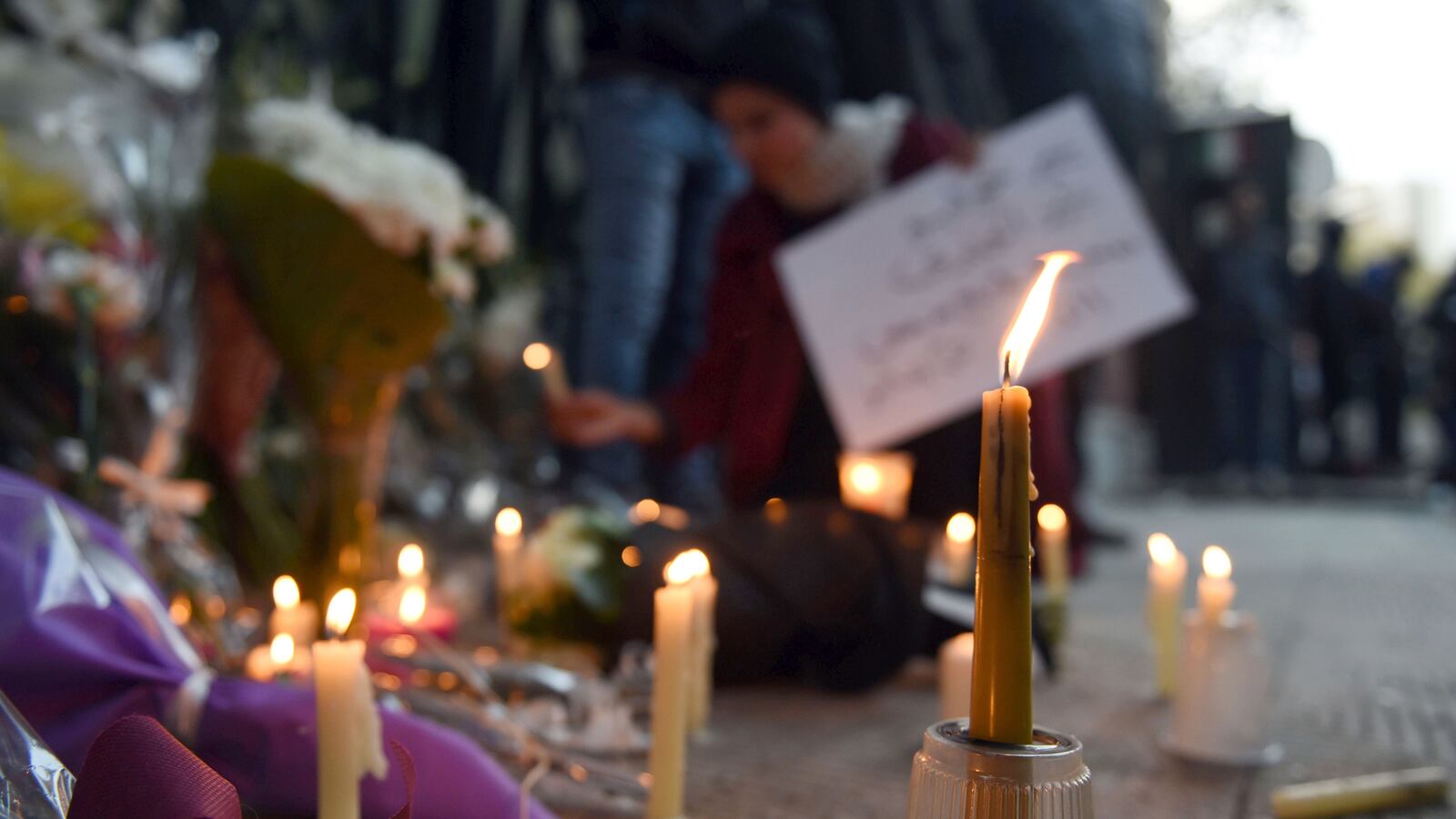CAIRO — “Don’t go to downtown Cairo on January 25,” was the warning that echoed throughout Egypt’s capital in the nervous buildup to the fifth anniversary of the 2011 revolution that unfurled in Tahrir Square and took the world by storm.
Fearing unrest, the authorities arrested journalists, rights activists and Facebook administrators of pages that had called for protests to mark the day. Some 5,000 flats around the downtown square were raided by the police and 180,000 troops deployed to the streets.
Masked men wielding rifles guarded the iconic rallying point on the day, as regime supporters danced, draped in Egyptian flags and posters of President Abdel Fattah al-Sisi. Everyone feared violent confrontations with Islamist protesters—many stayed home, others moved to quieter parts of the city.
Across town in the middle-class district of Dokki, a young Cambridge University Ph.D student messaged one friend to say he was setting off to meet another near Bab el-Louq, just off Tahrir. They would then go on to small birthday gathering in Giza.
Giuilo Regeni, 28, from Italy, had been in the country since September researching—and secretly reporting on—independent trade unions whose development was a victory of the 2011 Revolution, but now represented, controversially, one of the last vanguards of dissent.
The former Arabic language undergraduate, described as fiercely intelligent and very kind by those who knew him, expressed fears to friends in Cairo about going out on the difficult day, but they thought he was “over-worrying.”
“He sent me a text message saying he was going to this gathering and asking if I wanted to come,” his friend Amr Assad told The Daily Beast. “When I called him back around 7:50 p.m. his phone was off. The next day... I knew from the friend who was waiting for him downtown that he never arrived.”
Ten days later Regeni’s half-naked body was discovered covered with torture wounds in a ditch on the Cairo-Alexandria desert road. His finger- and toenails had been pulled out, the top of his ears cut off, his torso clawed with stab marks and cigarette burns, his spinal cord severed from the blow that killed him.
No one knows what happened, but the murder bore the hallmarks of a botched security forces interrogation, local and international right workers said.
Local Italian media claimed the torture was so severe he had likely been killed by the Egyptian “secret services” for being a spy, due to his sensitive research.
The Egyptian authorities vehemently denied the accusations, calling them “unacceptable” and “premature,” insisting criminal gangs were behind the killing.
But the repeated denials could not silence the mounting speculation that Regeni—like many Egyptians before him—was taken and ultimately killed because of his controversial studies and criticism of the state.
Five years on from the revolution that ousted Hosni Mubarak and rocked the world, Egypt feels frozen, frustrated and fearful.
Since the July 2013 military overthrow of unpopular Muslim Brotherhood President Mohamed Morsi, the country has witnessed an unprecedented crackdown on freedoms.
Morsi’s army chief Abdel Fattah al Sisi was elected president and oversaw the jailing of tens of thousands of perceived dissenters, and the killing of hundreds of others.
In the name of security and stability, as a flourishing insurgency spilled out of the Sinai, the Brotherhood was declared a terror group, protests without police permits were banned and civil society strangled.
Vague counter-terror laws emboldened the security forces and censored the press if they stepped out of line and published reports counter to the official story. Even academia came under fire: An increasing number of researchers were turned away at the airport, apparently because of their anti-regime stances, rights groups said. Or possibly, like Regeni, silenced.
Meanwhile, cases of enforced disappearances once associated with Mubarak’s security state were back again in greater numbers. Differing rights groups estimate between 100 and 1,800 people are being held in secret detention after being abducted by the security forces.
Whoever abducted Regeni, his brutal murder has thrown the issue of state kidnappings into the international spotlight. It highlighted Egypt’s forgotten: the ordinary people who vanished into thin air or down the rabbit hole of the judicial system, in a chilling war of attrition on dissent and a return to the old order.
Almost exactly five years before Regeni disappeared, Ibrahim Ahmed—a working class floor tiler from Cairo—vanished in similar circumstances: on his way from a Cairo suburb to Tahrir Square to witness the revolution.
At the time Ibrahim’s family received reports he ight be in military detention and searched police stations, prisons, hospitals and morgues.
Five years later his relatives still don’t know what happened to him but have kept up the grueling hunt. Every week they visit different prisons across the country, begging wardens for lists of new inmates and a glimpse inside the police holding trucks.
"Whenever I hear of people being transported to or from another prison, or of new inmates discovered, I stand outside and check,” said Ibrahim’s brother Ahmed el-Said, 45, who says there are dozens still missing from the 18-day uprising in 2011.
"We’re so desperate I even went to a psychic. The last report we had was when I paid $1,300 to a national security officer who told me in 2012 he was alive and would locate him, but he stopped answering my calls,” he added.
Ahmed believes his brother Ibrahim has been swallowed into the system holding the more recently disappeared: a series of secret prisons located in al-Galaa camp, the sprawling , 9-square-kilometer headquarters of the 2nd Field Army in Ismailia, some 60 miles northeast of Cairo.
Hanan Badr al Deen, a 28-year-old housewife from Beni Suef, thinks that is where her husband, Khalid is, too.
She last saw the 41-year-old on TV in the summer of 2013, after he had been shot in the head at a pro-Morsi sit-in at Rabaa al-Adiwaya in Cairo. Doctors in the makeshift field hospital were filmed trying to patch him up.
Over 70 people had died that day after the security forces opened fired on the encampment, claiming protesters had encroached on a bridge and turned violent.
By the time Hanan arrived at the scene, her husband had vanished. He was sent by ambulance to a nearby hospital, but never got there. Like Ahmed, Hanan trawled the hospitals, police stations, and morgues but found no trace.
“Three months later we were introduced to a man who takes money to deal with the authorities and locate the missing,” she said, echoing Ahmed’s journey, several years beforehand.
“He took several hundred dollars and told us that the authorities had started gathering cases similar to my husband together. It wasn’t until December that we learned about Azouli prison on the al-Galaa military compound,” she said.
At the end of July 2013, the three-floored Azouli became a secret detention center where Egyptians were tortured, interrogated and ultimately disappeared.
But now family members and detainees tell of a “new Azouli prison”—a yet more secretive jail on the same complex, created at the start of 2015 when old Azouli had begun to attract too much media attention.
Between 400 and 600 people are believed to be held in the al-Galaa compound, according to testimonies from former detainees, human-rights researchers, and families of the disappeared who talked to The Daily Beast.
The majority are from Sinai or the Nile Delta and are ultraconservative Salafis accused of involvement in the uptick of terror attacks in the violent aftermath of Morsi’s ousting. Some are suspected Brotherhood members, or student protesters, and more recently Egyptians, Syrians, or Palestinians who attempted to leave Egypt illegally via the Mediterranean crossing.
Ex-inmates and families claim torture ranges from “light beatings” to the electrocution of genitals, sexual assault, and being strung up naked for hours during an interrogation process that takes place in an infamous block known as “S.”
“Anything that is related to military intelligence is handled there, the interrogation can last several weeks. ‘High value suspects’ are tortured away from the others in S block,” said Mohamed Lotfy of the Egyptian Commission for Rights and Freedoms (ECRF), which has investigated the complex extensively.
Inmates of the prison who’ve been lucky enough to be released described a horrific world akin to the infamous Château d'If where the fictional Count of Monte Cristo was held.
“There were people who had been there for years—they looked like cavemen,” said a 22-year-old Palestinian detainee, held between September and December 2014. He was arrested by the army after illegally crossing through a tunnel to Egypt while fleeing the destruction of the Gaza War. Like many of the inmates, he was never formally charged.
“One person came from Turkey and had been in Egypt on holiday when he was taken. It was clearly a case of mistaken identity. But he was taken from our cell, tortured, and consequently paralyzed; he couldn’t walk anymore. We asked him what happened but he never spoke again,” he said.
More details of the secret prison came to light when lawyer Ibrahim Metwaly, desperately seeking his son Amr, who went missing at the start of July 2013 from the Rabaa sit-in, managed to secure rare access to the military court attached to the al Galaa complex. There he talked to fellow inmates already on trial.
In the comparatively small and battered courtroom, which can hold a maximum of 40 defendants, he saw people face a range of charges, from engaging in terror attacks to “scoping out check points” in the restive north Sinai, he said.
“I spoke to a few of the prisoners as they filed into the courtroom. That is when I learned about the ‘new Azouli’ or ‘Zubbat’—another prison on the same compound,” he said.
“Zubbat” (which means officers) used to contain holding cells for military personnel facing trial, but has since become a new detention center for civilians, he said.
Hanan, who also managed to access al Galaa’s court complex posing as a relative of an inmate on trial, corroborated the claim.
The ECRF, whose researchers have been investigating the new jail, said the ground-floor building is believed to contain at least seven cells of around 50 to 60 people.
A former inmate of the new secret prison—who was released in December—described being sexually assaulted, electrocuted, beaten with “metal pipes” and doused in feces and urine. He was interrogated about his political affiliations and his opinion of President Sisi, he said.
“Cuffed and blindfolded, the soldiers increased the beating, with metal sticks, electric shocks and hoses,” he said of the “interrogation.” “[A senior officer] ordered the soldier to undress me to my underwear, then he assaulted me,” the man said.
But while al Galaa has received unwanted media attention, rights groups fear a sister center called Agroot within the headquarters of the 3rd Field Army near Suez City.
Former inmates have nicknamed one of the complex’s alleged prisons “Serdab,” meaning hidden vault in Arabic. It is thought to be the most brutal in Egypt.
“We think it is a lot older than Azouli, we first heard of it operating in 2011 during the revolution. Sinai people know it very well. It’s so isolated, that is why it got its name,” said ECHR’s Lotfy.
Most of the inmates are from the restive North Sinai and suspected of belonging to terror groups. There torture is much more severe, with ex-detainees reporting that they had been electrocuted after being doused with water while hung up upside down, sexually assaulted and dragged around by their facial hair.
Meanwhile the Interior Ministry is also allegedly running hundreds of its own secret detention centers across the country, where civilians, many of them held without cause, also vanish.
Moselhy el-Desouki, from Shobra, said his 36-year-old son Hossam disappeared in October alongside five friends after visiting a disabled man, whose treatment they had paid for after hearing about his plight on Facebook.
Hossam reappeared a few weeks later in Cairo’s Zeitoun police station accused of possessing printed material that “blocked the roadmap of the country” and “incited against the state” despite never having ever attended a political rally.
The young accountant—“too poor to waste time being political”—was eventually acquitted of the charges but disappeared on the day of his supposed release Dec. 9, his father said.
After a month of futile searches, three of the friends detained with Hossam suddenly reappeared in different police stations on the outskirts of the capital. They said they had last seen him at a downtown Cairo police station, but the center’s officers denied he had ever been registered.
“I don’t know what to do. I don’t even know where to look any more. And I don’t know why this is happening,” Molselhy told The Daily Beast.
The authorities continue to deny these detention centers exist, complicating the issue. The Interior Ministry maintains that civilians are not held in secret or that torture is practiced, adding that the state-sanctioned National Council of Human Rights “regularly visits the prisons.”
“Since the beginning of 2015 they have held over 16 checks. Our prisons are run to international standards—there is no torture or maltreatment in our jails,” an Interior Ministry spokesperson said.
The Defense Ministry, meanwhile, declined to comment to The Daily Beast. But military officials in the past have denied camps like al Galaa are used to “disappear” citizens. They maintain that their prisons are only for military personnel who flout army rules or civilians who attack military institutions.
But even those who are held in the country’s 42 registered civilian prisons are lost in the bewildering judicial system.
They can face years of pre-trial detention, where they are held without being formally charged. Once they make it into the courtroom, many find themselves swallowed into mass trials.
According to U.K.-based NGO Reprieve, since March 2014 mass trials have become a feature of the Egyptian judicial system, with at least 15 ongoing and dozens of others yet to make it to court.
With hundreds of defendants squeezed into caged docks, the sessions are often adjourned before they can move forward, prolonging the process.
One such defendant is Ibrahim Halawa—an Irish high school student—who was just 17 years old and on holiday to Egypt when he was arrested in August 2013 at a pro-Morsi protest he went to photograph.
After two years in detention, he was sent to trial alongside 492 others on terrorism charges that could see him get the death penalty. So far there have been 12 hearings, which keep being adjourned, often because of the chaos in the courtroom, sometimes because of misplaced defendants.
“Time is my worst enemy,” Ibrahim wrote in his last letter smuggled out of jail in December. In the past he had written about being stripped naked, whipped with metal chains, and walked on by police officers.
His plight echoes another young detainee, freelance photographer Mahmoud Abu Zeid or Shawkan, 28, who was arrested while covering the Aug. 14, 2013, violent clearing of the Rabaa sit-in, during which so many Morsi supporters were killed.
Shawkan, who is suffering from Hepatitis C, also spent over two years in jail without formal charges. He is now standing trial alongside a staggering 737 people on murder charges, inciting against the country, and belonging to the banned Brotherhood.
The first session in December 2015 was adjourned to last week, so the authorities could build a bigger courtroom to accommodate the hundreds of defendants. On Saturday they postponed the session again and put Shawkan in a squalid solitary confinement cell, for no apparent reason.
“It’s increasingly clear that the mass trial process is just a Kafkaesque excuse for arbitrary imprisonment,” said Maya Foa from Reprieve, that continues to lobby for defendants like Ibrahim.
“Hundreds… have been through an appalling ordeal at the hands of the Sisi government over the past two and half years—an ordeal which still has no end in sight,” she said.
Despite mounting pressure from the international community the authorities have remained bellicose in their rhetoric on the crackdown.
In reaction to the international uproar at Regeni’s death, Interior Ministry officials initially claimed he had been killed in a traffic accident. The Foreign Ministry labeled the accusations of state involvement as “intentional distortions by those striving to regain a foothold in Egypt after being rejected by the people:” a thinly veiled reference to the Brotherhood.
On Wednesday they arrested 37 civilians, who had previous connections to kidnappings and murder, local media reported. Regeni, according to the state, was the victim of a criminal gang.
President al Sisi, meanwhile, warned against protesting, and has pledged to continue his “war on terrorism,” while Justice Minister Ahmed al-Zend vowed to carry out every death penalty handed down against the Brotherhood—a term now applied to all regime opponents.
“The fire burning in my heart will not die except when, for every [police] martyr, 10,000 Muslim Brotherhood members and supporters are killed,” he said in an impassioned speech on TV.
For those whose lives have been swallowed whole by the sentiment behind those words, there’s little to do but wait for change and for news of their forgotten loved ones.
“We have a saying here in Egypt: ‘If you have someone at your back you can’t be slapped on your front,’ and for us ‘little people’ that is how it feels. No one has our back, no one knows us or cares. No one is fighting our cause,” said Ahmed, while sketching out another week of prison visits to find his brother Ibrahim.
“I believe my brother is alive, I have not ever lost hope about that. But the worst is we just don’t know anything. And all we can do is hope.”





